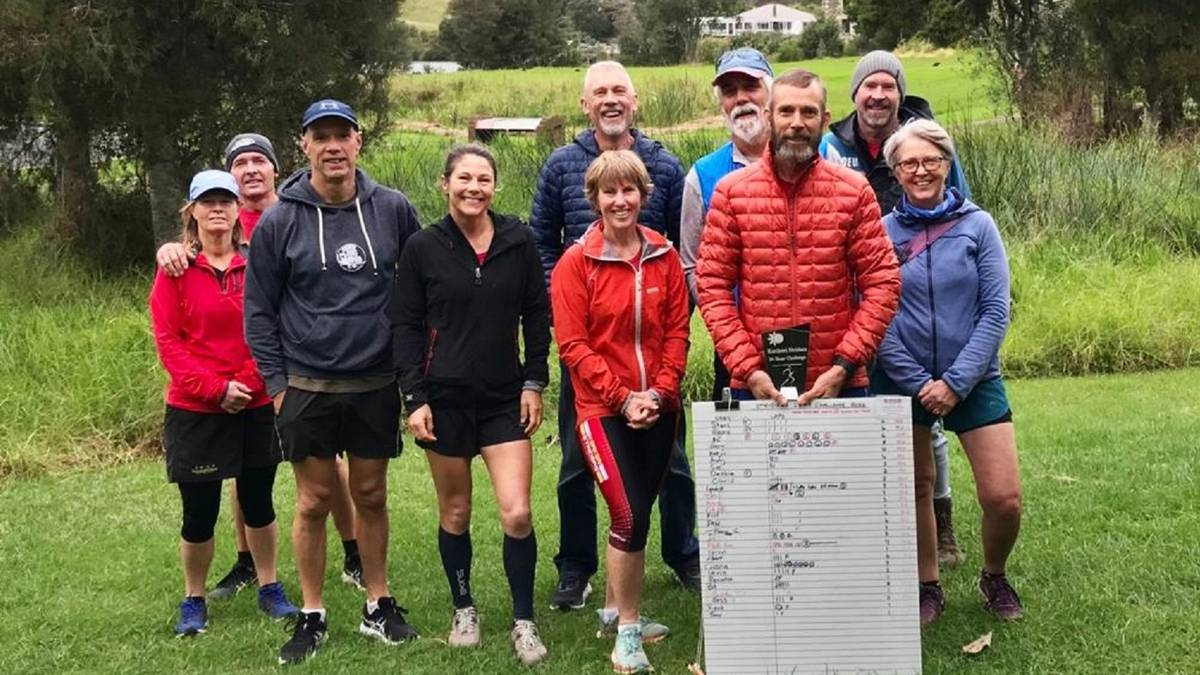Grant Allerby [front] won the Kerikeri Striders 24-hour event, running 116.5km from 8am Saturday to 8am Sunday in May. Photo / Supplied
Kerikeri athlete Grant Allerby is no stranger to long-distance running, having run a number of gruelling 160km races over the last decade.
But running 193km over six days and climbing to elevations of up to 3800m – higher than Mount Cook – during the TransRockies Run in mountainous Colorado takes it to the next level.
Allerby left for the United States last Tuesday to get in 10 days of hiking in the mountains before the race begins on August 1.
He has been preparing for the race by doing training runs around his Totara North farm and the local gravel roads, aiming to do 60 to 100km each week.
Sometimes he goes further, “but it’s a balancing act”, he said.
“You do too much and you’re likely to get injuries.”
The biggest challenge of the ultra will be the altitude, Allerby said, and for that he is having to “heat train”.
“I’m not used to the altitude, so the best I can do here is heat train.
“I go for a run, then have a hot bath for 30 minutes, I make it over 40 degrees and sit in there.”
Allerby has a few “hundies” (100 mile/160 km runs] under his belt in New Zealand.
He’s looking forward to tackling the epic journey from Buena Vista to Beaver Creek through the Colorado Rockies.
The route will take him and the other 200 international competitors over high mountain passes, creek crossings and rough terrain at elevations of 2300 to 3800 metres above sea level.
The race is split over six days, or stages, with each day running a set number of kilometres over different types of terrain such as dirt and gravel roads, paved roads and narrow trails.
Each night they’ll stay in tent camps.
/cloudfront-ap-southeast-2.images.arcpublishing.com/nzme/LSPXZFLOJIYDGHU6U7OIVK77ZU.jpg)
“It sounds like there’s a fun vibe about it,” Allerby said.
“I’ve done three days in a row and after that I’m pretty gassed, and that’s not at altitude.
“This is next level, it’s not one long push, it’s getting up day after day, it’s something I haven’t done before.”
The 61-year-old started running in his early 30s, coupled with stints of mountain biking.
He got into trail running and “loved that” and a passion for ultra running grew from there.
Allerby has been doing ultra-running events for ten years now, and has completed nine events over 100km.
“I was training for 60km and was at the stage I was doing back-to-back runs over the weekend.
“Once I entered the first one and went for the 85km… you think okay, I can do anything now.
“It’s a grind, you get sore feet, sore muscles, and cramps.
“It’s the way you manage it and use your mind.
“It’s relatively easy now because I’ve been there before. Once you get so far you don’t want to quit, it’s one foot in front of the other.”
Allerby belongs to Kerikeri Striders Multisport Club, a group for cyclists, runners, walkers, and multi-sporters including orienteering, and kayaking.
In May he won the Kerikeri Striders 24-hour event, running 116.5km from 8am Saturday to 8am Sunday, on an 8.96km loop course in Kerikeri.
Last year he won the same event with a total of 143.4km run in 24 hours.
Allerby decided to take part in the TransRockies Run after a previous trip to Mongolia in 2018.
“People asked if I going there for running, I said no just an adventure.
“I saw this pop up on Facebook and thought this combines both things, hiking in the mountains and doing a bit of a run.
“This is something a bit different, it’s quite spread out.”
Allerby also plans to run 80km near Coronet Peak in December.
What is ultra-running?
An ultramarathon is any running event longer than the traditional marathon length of 42kms, and is becoming increasingly popular.
The events include the six-day, 251km Marathon des Sables across the Sahara, and the Spine Race across the Pennine hills covering 431km.
The majority of ultra-races around the world are trail races, often run through beautiful and remote landscapes such as mountains or deserts.




